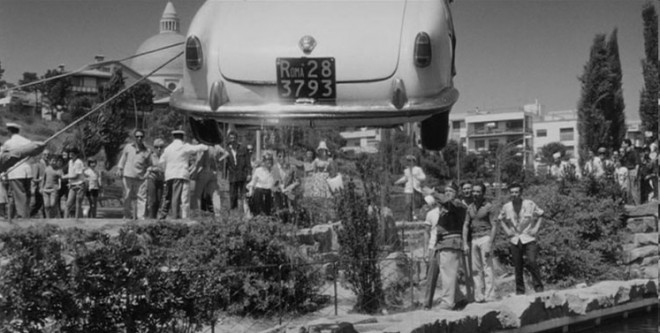Yet another remarkable documentary by Chris Marker, Description d’un combat (Hatzad Hashlishi Shel Hamatbaya) comes from France and Israel. It is about Israel: according to an ancient promise, the land that would come to be. Made when modern Israel was not quite thirteen years old, the film finds Israel poised for the future and in it; the opening montage, strikingly futuristic, reminds us that two years hence Marker would make La jetée. Angled, low overhead shots in the public marketplace in Tel Aviv suggest an alien point-of-view: we the audience as visitors from some other planet.
That “other planet” has a name: Europe. It is the Holocaust that required this new homeland, forged from endless desert—the wasteland that a phenomenal passage surveys. One connection to the past is ironic: a city’s Orthodox sector revives the European Jewish ghetto. A startling image is poetic, inconsolably tragic: invoking the Holocaust, the bare skeleton of a small tree inhabited by Jewish children, the living forever commemorating the dead.
Indeed, this is a film full of children and therefore full of hope. One patiently works on an ice cream cone. Another, in art class painting something we cannot see, “will never be Anna Franck,” the voiceover assures us. But there can be no holding back the truth: “threats . . . surround her.”
Shards of 1947 newsreels, set to alien mechanical sounds, show a shipboard exodus of displaced Europeans. “They fled from us,” meaning Western Europe, we are told; the British, to whom they appealed for help, put them back into camps. They have “the right to an ordinary life, paid for with Jewish blood.”
Others did not foresee the depth of Arab meanness that would attempt to deny a people their home.
Such heartlessness must have seemed unimaginable.

Dennis, your site is impressive and demonstrates a breadth and depth of cinematic knowledge. However, might I suggest that you restrict your writing to filmic critique and dispense with historical commentary? ‘Arab meanness’ betrays an unfortunate misunderstanding of simple facts: this ‘wasteland’ was inhabited long before a political ideology known as Zionism, which is secular in nature and has little to do with Judaism, was born, long before Britain gave birth to an Israeli protectorate, and long before this modern nation state was characterized by Archbishop Desmond Tutu as reminding him “so much of what happened to us black people in South Africa…the humiliation of the Palestinians at checkpoints and roadblocks, suffering like us when young white police officers prevented us from moving about.” Surely you agree that South African blacks weren’t ‘mean’ or ‘heartless’ in their struggle against and rejection of the grossly unjust socio-political system known as apartheid.
All the best for your website; it truly is a valuable cinematic resource. But please keep in mind that even the most brilliant auteur (Sans Soleil held me under its spell for over a decade) can still be seduced by the elusive beauty of illusion.
It goes without saying that I find my own brief remarks at the end of this capsule-entry the more historically accurate contextualization for the images that Marker’s 40-year-old film provides.